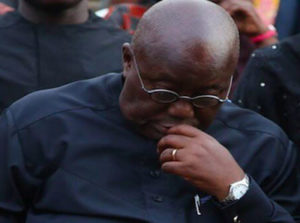Ghana finally goes to IMF, after government obstinacy crumbles
 The Ghanaian economy has barely been doing well, with the currency, the cedi, literally on life-support and doing badly against the US dollar. With inflation at an all-time high at almost 27 per cent and public debt almost at 80 per cent, some economists have been urging the government to seek help from particularly the International Monetary Fund (IMF). But the government has been obstinate, consistently claiming the economy is doing well, and saying Ghana would not go to the IMF.
The Ghanaian economy has barely been doing well, with the currency, the cedi, literally on life-support and doing badly against the US dollar. With inflation at an all-time high at almost 27 per cent and public debt almost at 80 per cent, some economists have been urging the government to seek help from particularly the International Monetary Fund (IMF). But the government has been obstinate, consistently claiming the economy is doing well, and saying Ghana would not go to the IMF.
The Administration has been largely tone-deaf, intolerant of divergent views and suggestions, high-handed and myopic, while having a large number of Ministers and appointees, most of whom have not been effective nor efficient. While at it, in the face of the hardships, the President continues to travel on expensive rented luxury private jets at the expense of the public purse he had pledged to protect.
As some critics point out the mismanagement and indiscipline in government, government appointees showed even more insensitivity and claimed the current economic situation in the country is due to the outbreak of the COVID-19 and the Russia-Ukraine conflict. As a matter of fact, these two events have indeed, affected the global economy, but that does not discount the poor performance of the government in its management of the economy.
This morning July 1, 2022, however, the government with the record of the most corrupt since the Fourth Republic, clothed in ineptitude and wallowing in mismanagement, profligacy and impunity, has buckled and announced it is going to seek help from the IMF. The President has written to the Minister of Finance instructing him to initiate talks with the IMF.
The writing has been on the wall for a long time now. But the Akufo-Addo Administration kept believing in its own lies that his government was working to take Ghana beyond aid, an empty sloganeering that endeared him to many Africans – but the reality on the ground has consistently shown that the government’s own misconducts would take the country to the opposite direction.
The lack of discipline in fighting corruption and opposition to anti-corruption groups and individuals which culminated in the public attacks on the former Auditor-General, Daniel Domelevo and his eventual removal from office, despite his stellar performance, especially as he strictly applied the law on disallowance and surcharges confirmed how corrupt the government is.
The Auditor-General’s Department under Domelevo earned commendation from the World Bank in a report titled, “Enhancing government effectiveness and transparency: The fight against corruption.”
In this report the Bank listed some of the achievements of the Ghana Audit Service (GAS) under Domelevo: “Several key undertakings have contributed to GAS’s impact on financial integrity: Judicious use of disallowance and surcharge powers In 2017, the Supreme Court ruled that the AG be required to exercise its powers of disallowance and surcharge to commence the recovery of public funds that have been found to be illegally spent or lost through negligence or misconduct,” it noted.
These powers enable the AG to disallow any unlawful expenditure and impose a surcharge on the person(s) responsible. Anyone aggrieved by a disallowance or a surcharge can appeal to the High Court as provided for by Article 187(9) of the Constitution within 14 working days of the surcharge. To facilitate the process, particular courts were identified and assigned by the Chief Justice to hear these appeals, the report said.
The attacks on Domelevo and his final removal from office in a crude manner, engineered by the President’s Secretary, Nana Asante Bediatuo demonstrated the deep-rooted graft perpetrated by people high up in government.
Since Domelevo’s removal, the Auditor-General’s report, which continues to show the levels of mismanagement by public officials, appointed and elected, has returned to being a mere annual ritual of ‘who is who’ in misusing and embezzling public funds without any repercussions.
Two years ago, the Special Prosecutor, one of the state anti-corruption officials, Martin Amidu, the first to be appointed in that role, was also compelled to resign following what some observers believed were due to obstacles impeding his ability to work, mostly put there by government officials.
Sometime in May this year, the Finance Minister, Ken Ofori-Atta had said at a press conference that he was confident that the measures being pursued by the government were taking the country in the right direction and there would be no need to go to the IMF, especially so, with the implementation of the obnoxious punitive Electronic Transaction Levy (E-Levy), but one month after its implementation, the outcome of the E-Levy has been most underwhelming, as the government could not generate even 20 per cent of the projected revenue.
The announcement this morning to go to the IMF therefore, shows only one thing – that the inept, incompetent, corrupt and short-sighted government has failed, as none of its ideas, if it ever had any useful ones, have never worked.
By Emmanuel K. Dogbevi
Copyright ©2022 by NewsBridge Africa
All rights reserved. This article or any portion thereof may not be reproduced or used in any manner whatsoever without the express written permission of the publisher except for the use of brief quotations in reviews.
